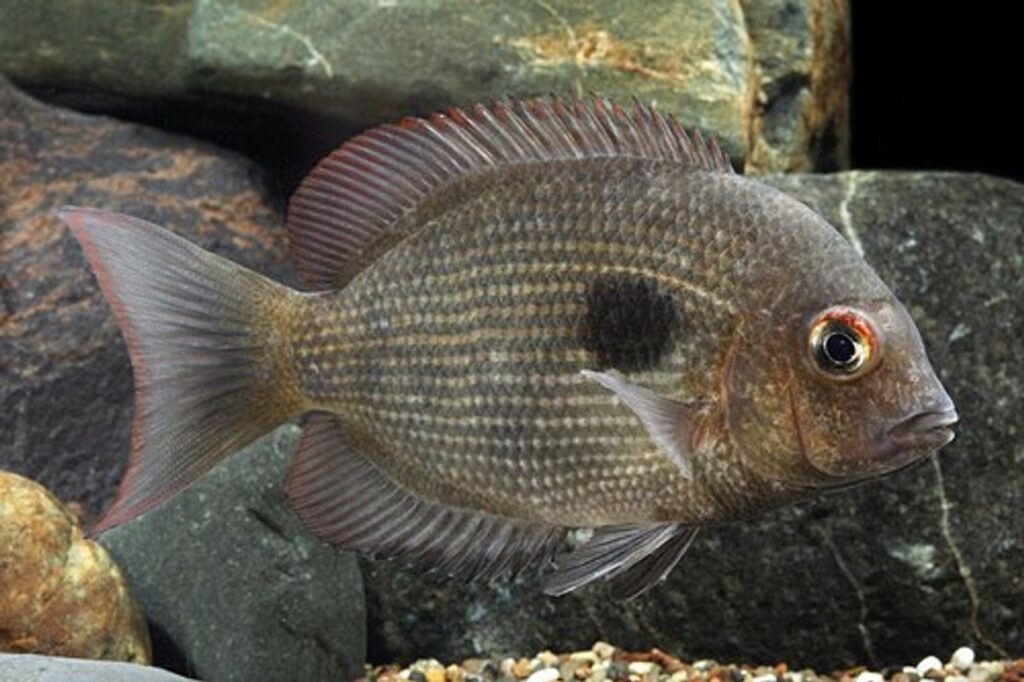8 World’s Most Rare Freshwater Fish Species, There is a consensus among experts that freshwater fish are the most endangered category of animals in the world.
The most significant dangers that wild freshwater fish face today are the destruction of their habitats, the contamination of their waters, and excessive fishing.
The freshwater fishes that are included on this list are extremely uncommon because they are on the verge of extinction in their natural habitats, and some of them may already no longer exist.
Even while conservation efforts have been going on for quite some time, it is not always the case that the ecosystems in which these freshwater species dwell are being safeguarded adequately.
If humans do not exercise greater caution, it is possible that several of the freshwater fishes on this list will become extinct entirely.
8 World’s Most Rare Freshwater Fish Species
1. Moapa Dace
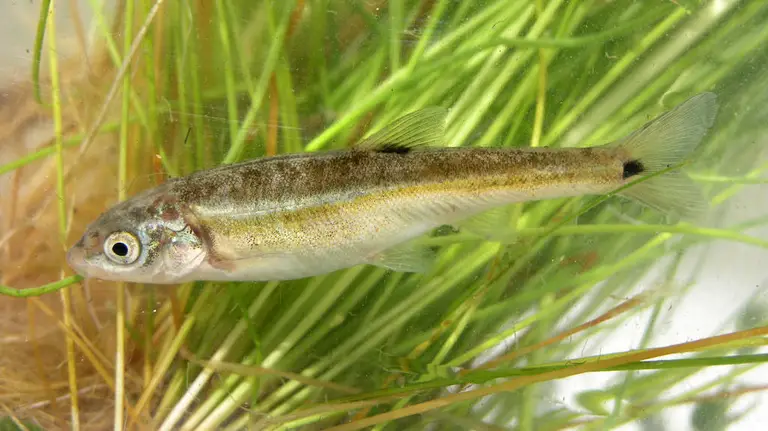
- Current Estimated Numbers: about 450 – 460
- Range (Location): Muddy River (formerly the Moapa River), Nevada, USA
- Size of Range: 16 km (10 mi)
- Scientific Name: Moapa coriacea
- Conservation Status: Critically Endangered
This species of fish, which is today believed to be quite rare, was thought to be quite common when it was initially identified in 1938.
When the shortfin molly, also known as Poecilia mexicana, was introduced into the habitat of the Moapa Dace in 1963, their population quickly began to decline.
After a few years, the Moapa Dace was given the status of endangered, and this diminutive freshwater fish has never really recovered since then.
According to the most recent surveys, which were conducted roughly a decade ago, there are between 450 and 460 Moapa Dace left in the wild.
The Moapa Dace is still subject to the same dangers as it was in the past, including the eradication of its natural habitat and the modification of existing habitats. Even though a recovery strategy for the Moapa Dace was proposed as early as 1983, it has not been appropriately put into action.
The Centre for Biological Diversity is one of the organizations that is striving to safeguard the Moapa Dace, and they have been fighting nonstop to prevent new water developments in the area of the Moapa Dace’s habitat and in the surrounding areas.
2. Conasauga Logperch
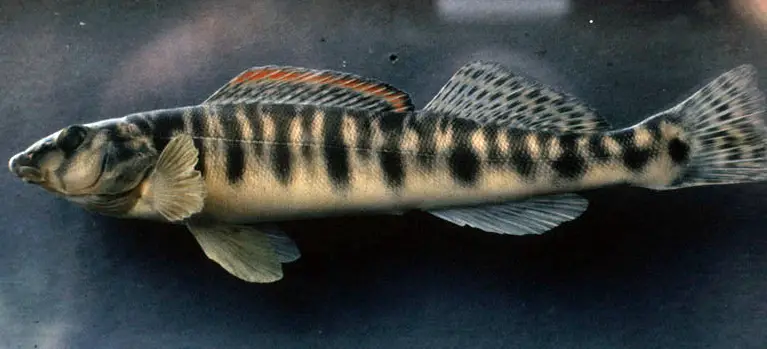
- Current Estimated Numbers: fewer than 200
- Range (Location): Conasauga River in Georgia and Tennessee, USA
- Size of Range: 45 km (27 miles)
- Scientific Name: Percina jenkinsi
- Conservation Status: Critically Endangered (CR)
There is a species of darter fish that is indigenous to North America called the Conasauga Logperch.
To be more specific, the Conasauga Logperch is endemic to only a certain section of the Conasauga River in Georgia and Tennessee, which spans approximately 27 miles (45 kilometers). The IUCN Red List estimates that there may be less than 200 individual Conasauga Logperch fish still living in the wild today.
The Conasauga Logperch is the subject of current conservation efforts in the wild to ensure its continued existence.
Conservationists reintroduced 382 tagged Conasauga Logperch into their natural habitat in the year 2012, and many of them were found to be alive during later surveys.
3. Devils Hole Pupfish
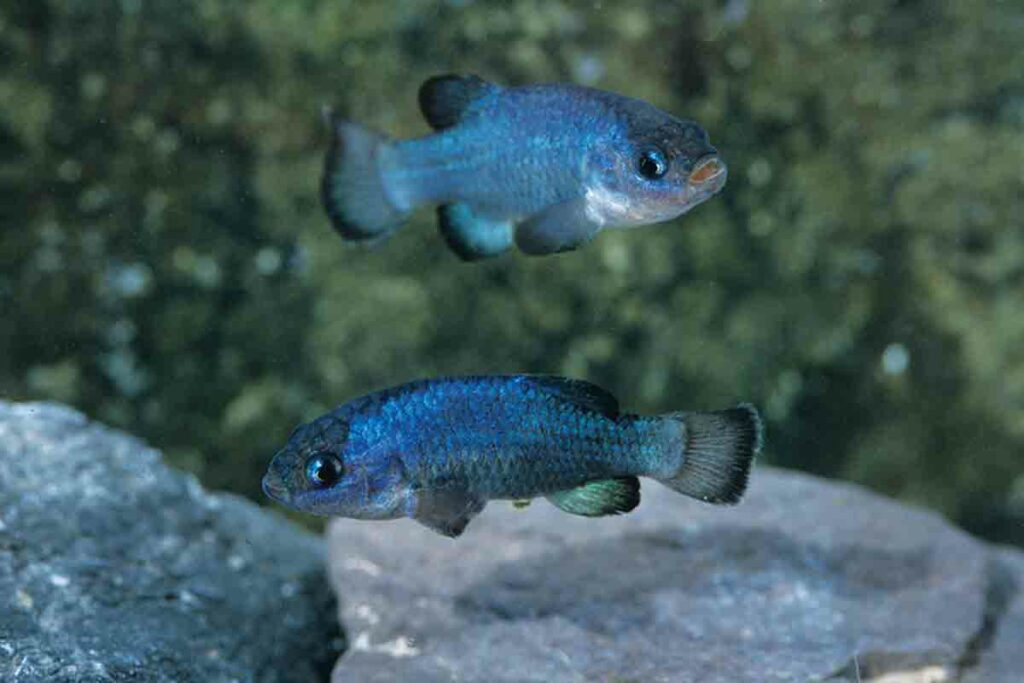
- Current Estimated Numbers: about 187
- Range (Location): Devils Hole, Ash Meadows, Death Valley National Park, Nevada, USA
- Size of Range: Unspecified small cave lake (smallest geographic range on any vertebrate)
- Scientific Name: Cyprinodon diabolis
- Conservation Status: Critically Endangered (CR)
The Devil’s Hole Pupfish is a charming little blue fish that may be found in a cave lake at the Devil’s Hole in Death Valley National Park, Nevada. Despite its menacing-sounding name, the Devil’s Hole Pupfish is actually quite harmless.
Since the beginning of monitoring efforts, the Devil’s Hole Pupfish population has never been estimated to number more than 553 individuals.
The number of Devil’s Hole Pupfish has been steadily decreasing over the past few decades, with the count reaching a record low of only 35 individuals in the year 2013.
In October 2018, researchers announced some encouraging findings when they stated that they had counted approximately 187 Devil’s Hole Pupfish when conducting their most recent survey. This was a welcome piece of information. Since 2003, this is the year with the largest number of Devils Hole Pupfish ever recorded.
According to the experts, the current population of Devils Hole Pupfish appears to be in good health, and the bulk of the fish are either juveniles or young adults.
4. Futuna’s Emperor
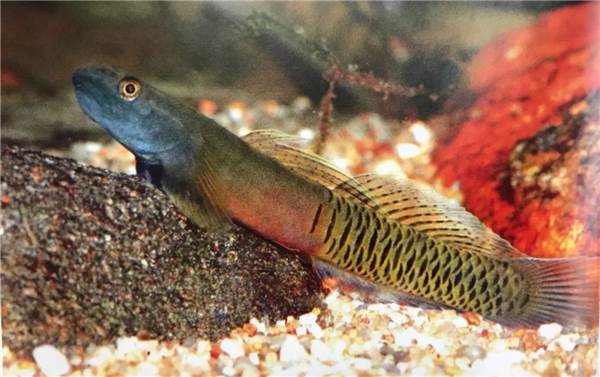
- Current Estimated Numbers: Unknown; only about 20 specimens were observed in 2011
- Range (Location): Island of Futuna, Wallis and Futuna
- Size of Range: 5 km (3.1 mi)
- Scientific Name: Akihito Futuna
- Conservation Status: Critically Endangered (CR)
The Futuna’s Emperor is a species of freshwater goby that was only found in one river on the island of Futuna, which is located in the South Pacific. This goby was only identified very recently.
On the island of Futuna, there are a total of five streams, and it is speculated that the Futuna Emperor formerly inhabited all of them. In the past, its population may have been significantly larger.
It is not known how many Emperor fish are now living in the waters of Futuna. Researchers were only able to identify approximately 20 individuals in
the most recent study in 2011. The elimination of the Futuna Emperor’s natural habitat as a result of human activities such as taro farming and building construction poses the greatest danger to this endangered species.
Although not much is known about the Futuna’s Emperor, experts believe that the freshwater goby is most comfortable in water with a temperature of about 20 degrees Celsius (68 degrees Fahrenheit).
The temperature of the seas in which the Emperor of the Futuna resides has grown as a result of farming practices.
5. Diamond Darter
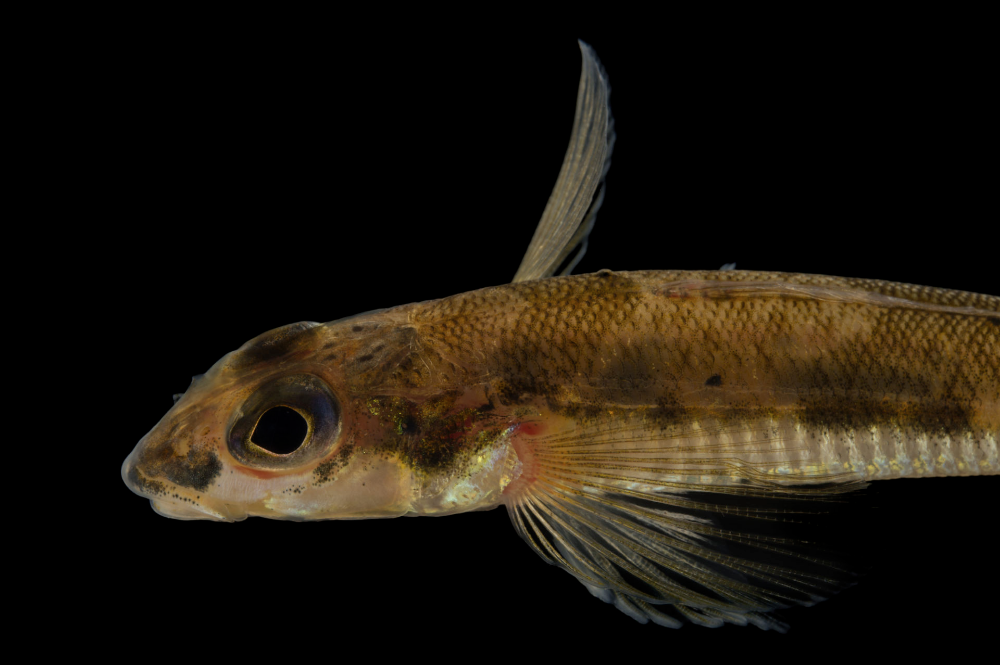
- Current Estimated Numbers: Unknown; only 19 specimens caught in the past 30 years
- Range (Location): Elk River, West Virginia, USA
- Size of Range: 22 mi (13.67 km)
- Scientific Name: Crystallaria cincotta
- Conservation Status: Critically Endangered (CR)
On this list is still another species of rare freshwater fish called the Diamond Darter, the population numbers of which are unknown at the present time.
Even though the first specimens of this tiny freshwater fish were gathered in 1980, it wasn’t until 2008 that it was fully described due to how rare it is. The Elk River in West Virginia is the only place in the world where it can be found.
During the previous three decades, just about 19 Diamond Darter specimens have been captured, despite the fact that several efforts have been made to locate the natural population of Diamond Darters.
In 2013, the United States Fish and Wildlife Service made the announcement that the Endangered Species Act would be used to provide legal protection for the Diamond Darter.
The Elk River, which is home to the Diamond Darter, is continuously put in danger by a number of human activities, including coal mining, oil and gas production, siltation caused by these and other causes, and poor sewage and wastewater treatment.
The destruction of its habitat and the deterioration of the water’s quality as a result of these activities pose the greatest risks to the existence of the diamond darter.
6. Alabama Sturgeon

- Current Estimated Numbers: Unknown; possibly extinct in the wild; only six specimens caught since 1997
- Range (Location): lower Alabama River, Alabama, USA
- Size of Range: about 216 km (134.22 mi)
- Scientific Name: Scaphirhynchus suttkusi
- Conservation Status: Critically Endangered (CR)
The Alabama Sturgeon is one of the rarest of all sturgeon species; overall, sturgeon are among the freshwater fish in the world that are considered to be among the most endangered freshwater fish in the world.
The United States Fish and Wildlife Service designated the Alabama Sturgeon as critically endangered in the early years of the new millennium due to the species’ extremely low population numbers and its inability to grow those numbers through natural means.
Since 1997, researchers have only been successful in capturing six Alabama Sturgeon specimens, and in the past ten years, there have only been three Alabama Sturgeon sightings confirmed.
For a considerable amount of time, scientists were under the impression that the Alabama Sturgeon had become extinct.
However, in 2016, researchers discovered the species’ DNA in several different places along the Alabama River, leading them to the conclusion that the Alabama Sturgeon is still in existence.
The recent discovery provides scientists with new grounds for optimism; their goal is to understand more about the Alabama Sturgeon in order to assist in the recovery of the species population.
7. Damba Mipentina
- Current Estimated Numbers: Unknown; no specimens were seen during the most recent surveys in 2011; small number bred in captivity
- Range (Location): Betsiboka and Mahajamba river basins in northwestern Madagascar
- Size of Range: 100 km² (38.6 mi²)
- Scientific Name: Paretroplus maculatus
- Conservation Status: Critically Endangered (CR)
The Damba Mipentina is a species of freshwater fish that is considered to be in a highly endangered state because it has not been spotted in any of its known habitats for many years.
Previous assessments of the Damba Mipentina population revealed that the population was rapidly decreasing, but it is unknown what the state of the population is at the present time.
It has never been seen in the wild and there is no evidence to suggest that the Damba Mipentina even still exists, making it one of the rarest species of freshwater fish in the entire world.
Overfishing, the destruction of habitat, and the introduction of non-native invasive species, most notably the Asian snakehead, are believed to be responsible for the extinction of the Damba Mipentina in its natural environment.
Even though the population of wild Damba Mipentinas is unknown and a reason for concern, there are a few fish enthusiasts who are successfully breeding the species in captivity.
8. Chinese Paddlefish
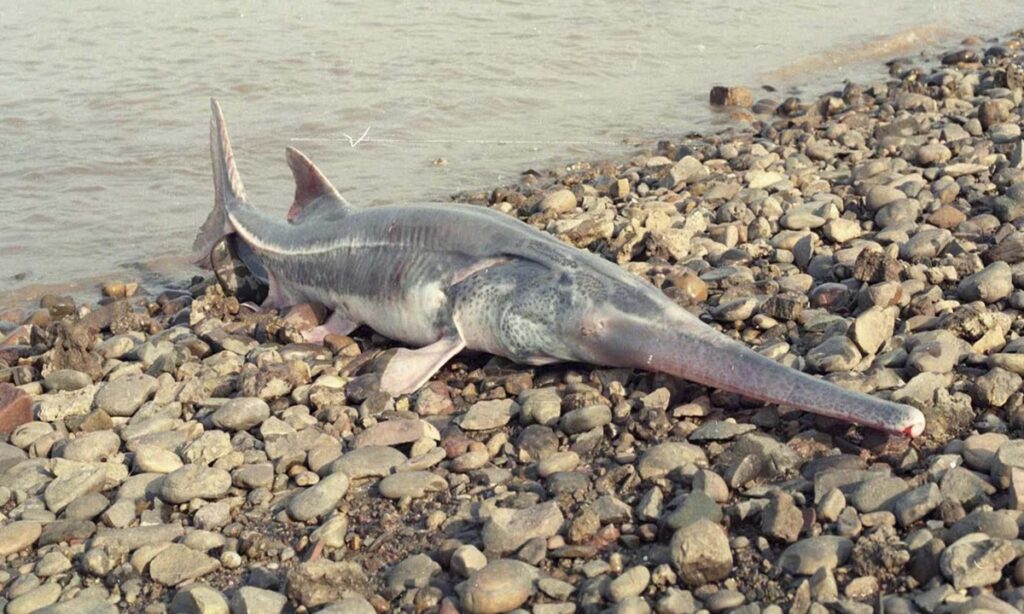
- Current Estimated Numbers: Possibly extinct in the wild; none have been seen since 2007
- Range (Location): Yangtze River, China
- Size of Range: Unspecified
- Scientific Name: Psephurus gladius
- Conservation Status: Critically Endangered (Possibly Extinct)
It is absolutely unknown what the state of the Chinese Paddlefish is in the wild at this moment, and the last time anyone saw an adult Chinese Paddlefish was in 2007.
The Chinese Paddlefish is still listed on the IUCN Red List as being critically endangered status, despite the fact that there is a possibility that it has become extinct in its natural habitat.
It is possible to consider the Chinese Paddlefish to be the rarest freshwater fish in the world due to the lack of current evidence suggesting that the Chinese Paddlefish even still lives and the absence of any Chinese Paddlefish in captivity.
A study that was published by National Geographic in 2009 stated that there had been no sightings of juvenile Chinese Paddlefish since the year 1995.
This lends credence to the hypothesis that the Chinese Paddlefish is not reproducing. The few Chinese Paddlefish that have been collected in the past have been the subject of repeated failed attempts to start a captive breeding program.
Despite this, the last known captive breeding pair of Chinese Paddlefish passed away in 2004, when the female was carrying their unborn child.
8 World’s Most Rare Freshwater Fish Species- Newshub360.net
Related Post
Credit: www.Newshub360.net

